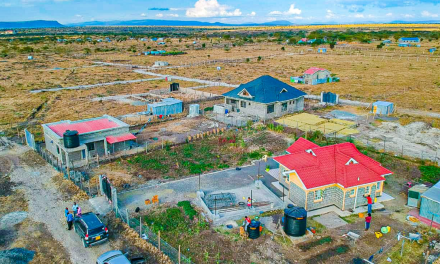In the year 2020, the value of the real estate sector hit over $326.5 trillion, establishing its place among the best investment opportunities available everywhere today. Because of the continuously escalating price of land in Kenya, the real estate sector there is experiencing fast expansion.
Because of this, there has been a significant increase in the number of investors, forming many development firms.
Most first-time investors need to have at least some fundamental understanding of how to enter the real estate market stream. In Kenya, you can choose from these three primary paths.
This post will walk you through how to invest in real estate in Kenya and give insights on succeeding in this venture.
How to Invest in Real Estate in Kenya
1. The Acquisition of Property
This is one of the most fundamental steps when starting real estate in Kenya. It’s been said that you shouldn’t hesitate to buy but rather buy now and wait.
The prevalent practice in the Kenyan population is to buy land to resell it at a higher price after some time (because all land’s value rises over time).
Most seasoned investors would favor purchasing land in a prime area wherever possible to maximize the earnings that may be made.
Investors can increase their returns by various means, such as securing the land with fencing, hooking it up to the power system, and channeling water lines toward the property.
Buying land comes with both positives and negatives that need to be considered.
Pros
- Instead of purchasing land with some development, the initial investment cost is less expensive here.
- There are many different options available for how the land could be used. The property is suitable for a variety of purposes, including agriculture, the raising of poultry, and the building of other kinds of buildings and structures.
- The upkeep required for the land is on the simpler end of the spectrum. Most investors merely need to cut the grass on the property for maintenance. Nevertheless, if the land in question is situated in a desirable area, it is in your best interest to conduct follow-up inspections after a while.
- The land possesses more transparent documents, some even open to the public. One can easily access land records at the Lands Ministry, where they also have the option to employ an agent to get the information for them.
Cons
- When you own land, you risk having it encroached upon. Con artists constantly put landowners in danger by leading unsuspecting victims to believe they have the right to sell a piece of property that does not legally belong to them. This results in additional legal fees for the landowners, some of which they may not be able to recoup in any way.
- Selling land is a slow and drawn-out process. Even though the ground is among Kenya’s most sought-after real estate investments, selling it can take some time because most people need more financial resources to buy it. Because purchasing land is such a significant investment, most people take their time developing a plan for where to put their money.
- There are a few different financing options available for the acquisition of land. Because purchasing land differs from buying a house, obtaining financing for land purchase is complex. Most credit unions and banks do not provide loans for buying land.
2. Purchasing or Building Residential Property
The majority of Kenyans, as a further alternative, are seriously contemplating the acquisition of properties. This method is more expensive than buying land because it involves an additional step.
After purchasing land and developing it by constructing residential houses on it, a person has the option, at a later time, of either renting out the properties or selling the entire piece of property.
This choice results in more significant returns but involves a more excellent capital investment.
Pros
- Increased potential for profit margins. Compared to the sale of land, there is a more significant profit potential when renting out or selling real estate.
- The property is entirely under the owner’s control at all times. The original owner will have complete authority over all aspects of the property, including the layout, the number of tenants, and any modifications or improvements made to the residence.
- The property ensures the owner’s financial stability on its own. As a result of the high perceived value of residential properties, financial institutions such as credit unions and banks are more likely to support the endeavor.
- The value of the property will increase over time. Because of the land cost and the degree of growth in the area, the value of residential homes can only go up over time.
Cons
- The price of construction is more expensive. Even building residential structures needs a significant initial investment, and the project may go over budget before it is finished.
- Investing in residential real estate typically involves a long-term commitment. It could take some time for the property to recoup the initial investment, and it could take even longer to generate any return.
Although disposing of the property is another approach to recouping the costs more quickly, it takes a while to find a willing buyer and even more time for the buyer to complete paying for the property.
3. Acquiring or Developing a Piece of Commercial Real Estate
Investing in commercial real estate is considered one of the safest ways to make money in the real estate market. In addition to having a higher profit potential, it is better than residential real estate.
Most commercial properties are subject to lease contracts that last at least a year and can go up to five years or more, ensuring that the property owner will receive money throughout the contract.
Building a commercial property from the ground up or purchasing an existing one is a labor- and resource-intensive endeavor that calls for a significant investment of money.
Pros
- The possibility of making money is through the roof. When making a profit, purchasing commercial assets is a strategy that consistently favors property owners. After an expired lease agreement, the owners can conduct a market analysis to determine the property’s value.
- Commercial real estate requires little maintenance. Because business owners typically mold the property to meet the business model they intend to build, they are not required to perform major maintenance on the property. This frees up the owners from the responsibility of doing major maintenance.
Cons
- Bigger initial investment. The building or buying of a commercial property demands a larger quantity of cash than the construction of a residential property; in fact, the figures imply that the amount of capital required is approximately 400% higher.
- Help from an experienced professional is necessary. Construction of a commercial property, or simply the purchase of one, takes a significant amount of assistance from a wide variety of specialists, such as city planners, lawyers, engineers, contractors, quantity surveyors, and many others.
- There is a requirement for a more significant time commitment. Compared to residential properties, commercial properties require a more substantial time commitment from the owner.
- There is a more significant potential for harm. Properties with commercial uses are typically located in the heart of towns, where they are most likely to attract customers from the surrounding neighborhoods. This indicates that preventive actions must be taken to reduce the likelihood of any potential harm.
In Conclusion
In Kenya, the population, as well as other international investors, have shown a significant amount of interest in the many real estate alternatives that are currently accessible. The market for real estate is expected to continue expanding for the foreseeable future, making it a highly viable investment that still has some ground to cover.





